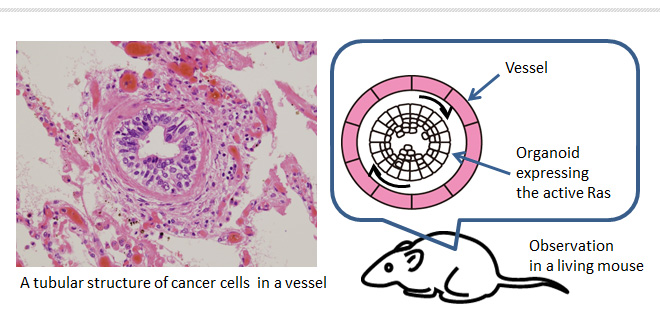|
HOME > Proposed research projects > 2014-2015: Proposed research projects 17
 2014-2015: Proposed research project 17Rotation of a gland in a vessel and its invasion and metastasis
Purpose of the Research ProjectRAS genes are frequently mutated in various human tumors. These mutations cause GTPase RAS to remain locked in constitutively active signals through the downstream cascades leading to proliferation. We previously utilized an auxin-dependent protein expression system, which enabled us to rapidly induce and evaluate constitutively active Ras in MDCK (Madin-Darby Canine Kidney) cysts, a model for polarized epithelial structure. We observed that some cells in the cyst wall lost polarity and were extruded into and accumulated in the luminal space. Live cell imaging with cell cycle indicators showed that the active Ras expression promoted cell cycle progression. Surprisingly, we also found that cysts started to rotate cohesively upon active Ras expression. Tubular or cystic structures in the body are anchored each other; therefore, it is difficult to imagine that such structures rotate in the epithelial organs in the body. In contrast, the tubular or cystic structures consisted of cancer cells are frequently observed in vessels of patients. We take the Ras-expressing organoid as a model of tubular or cystic structures in the vessels, and investigate its behavior in vivo Content of the Research Project1) By comparing mRNAs from MDCK organoids with or without active Ras, we will extract genes/pathways regulated by the active Ras. Expression of these candidate proteins will be examined in pathological sections from Ras-mutated cancers. Expected Research Achievements and Scientific SignificanceMalignant tumor cells invade and metastasize to other organs, while benign tumor cells do not. Since metastasis of cancer cells requires evasion from vessels, it is important to observe the events of the cancer cells in vessels in vivo. Even though the effect of RAS mutations on prognosis is still controversial, our in vitro findings suggest the possibility that active Ras participate in mobility of cancer cells. Identification of molecules that are regulated by active Ras and regulating metastasis will help to establish the diagnosis and treatment of cancer metastasis.
|








